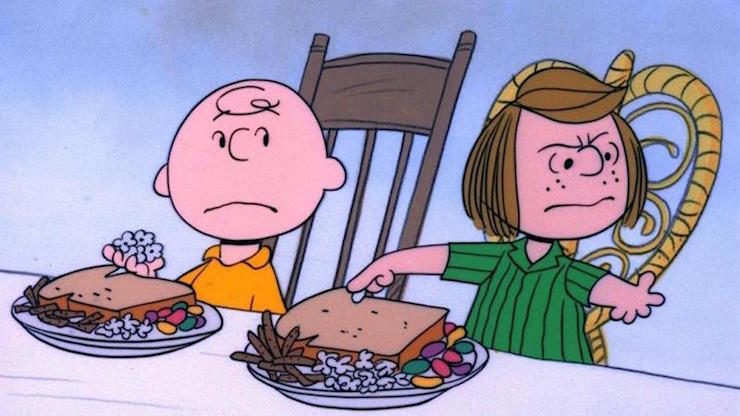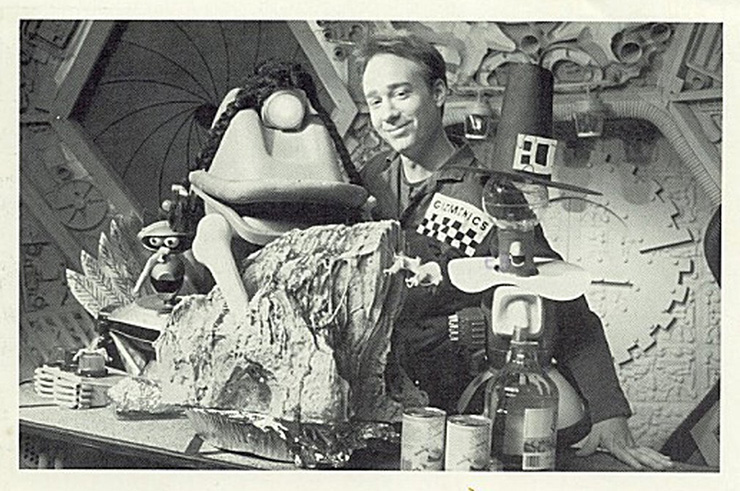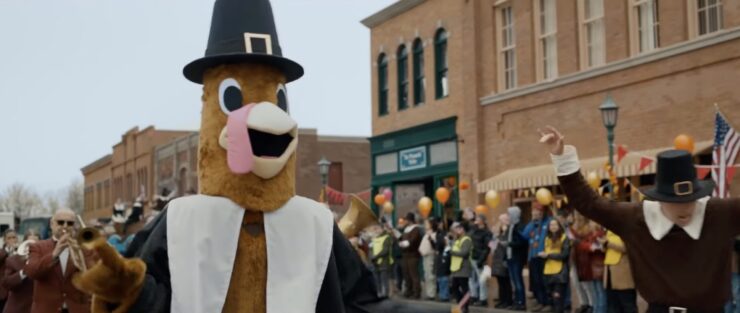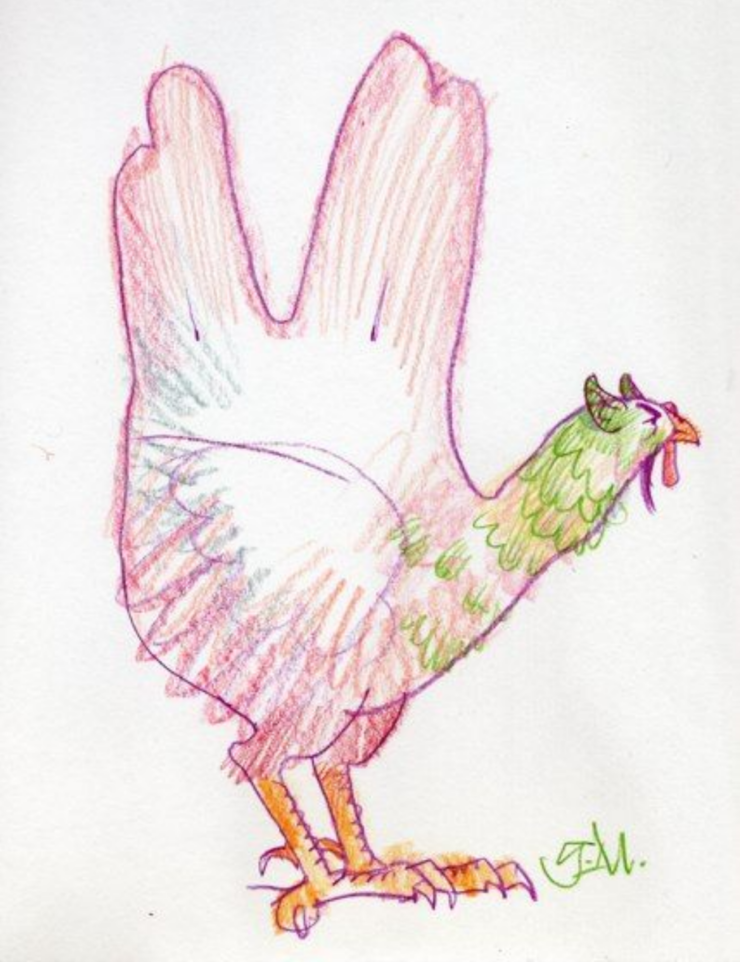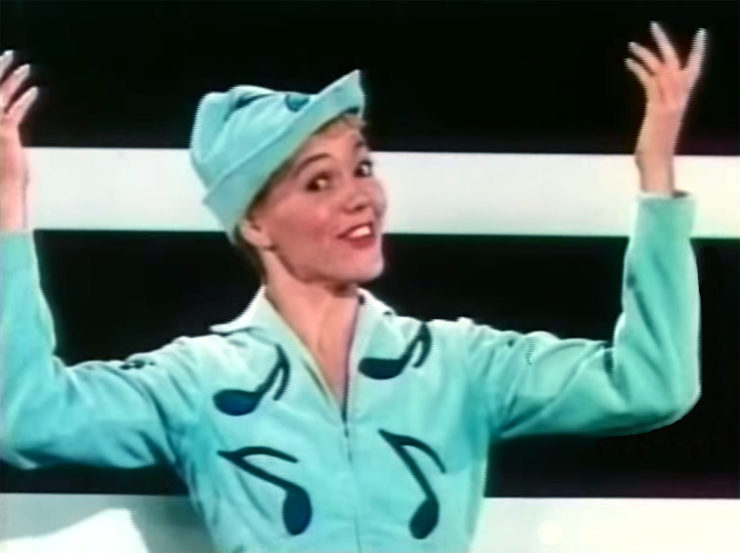A Charlie Brown Thanksgiving is the least of the Big Three Peanuts holiday specials. The Peanuts Gang’s take on Halloween gave us The Great Pumpkin, and A Charlie Brown Christmas became the standard by which all other Christmas specials were judged. When the Gang tackled Thanksgiving, however, there just wasn’t as much to dig into.
Or so I remembered.
But when I rewatched this one I found that the show packed a surprising amount of depth in between all the Snoopy shenanigans and toast-buttering montages. In fact if you look closely enough, I think you might find a statement about what it means to be an American.
Whither Lucy?
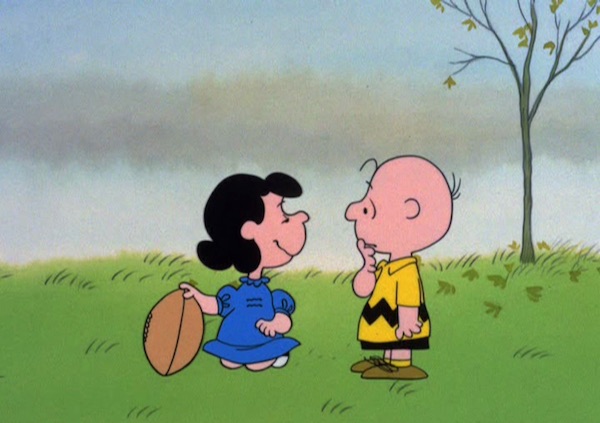
Lucy appears in the opening of the special. She waxes poetic about the tradition of Thanksgiving football, then yanks the ball away before Charlie Brown can kick it. And then? She disappears. She is banished from the special, and doesn’t return for the climactic meal. I’m going to assume that the producers were worried she’d throw off the delicate balance they’d set up between Charlie Brown, Patty, and Marcie, but it becomes increasingly unsettling to watch her little brother spend Thanksgiving alone with the Browns.
After his flirtation with The Great Pumpkin, Linus returns to form.
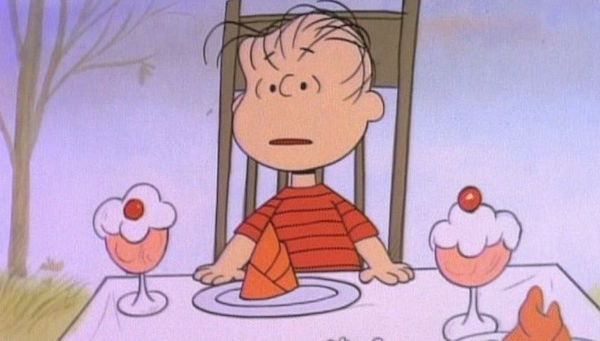
Our thumb-sucking prophet returns! Linus, having shaken off the Great Pumpkin’s betrayal, is once again ready to help his friends with historical factoids and inclusive theology. When Charlie Brown is overwhelmed by the thought of unexpected guests, it is Linus who tells him to eat two dinners, thus appeasing everyone. When Patty points out that they should say grace before eating, it is Linus who just happens to have memorized the prayer said by Elder William Brewster over the first-ever Thanksgiving feast. And when Patty erupts in rage at Charlie Brown’s incompetence, it is Linus who puts their argument in a historical context, reminding everyone that while Thanksgiving dinners come and go, the imperfections of human nature are eternal.
I Find the lack of grown-ups disturbing.
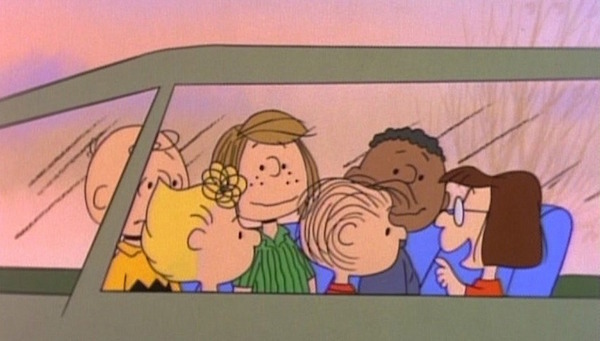
OK, so it makes sense that there are no visible grown ups in the Halloween special—adults are there to dispense candy. That is all. And in A Charlie Brown Christmas, the kids are putting on a pageant seemingly on their own, which can be interpreted as the community encouraging the kids to take responsibility for the show. Fine. But Thanksgiving? Thanksgiving is explicitly a family holiday. The pop culture narrative of Thanksgiving is all about trying to get home, having to suppress their own personality once you get home, squeezing every possible drop of comfort (and cash) out of your parents, or hosting (disastrous) dinners of your own.
Parents are always absent in the Peanuts universe, but in the Thanksgiving special their absence becomes eerie. And it isn’t just Charlie Brown’s pocket of the universe. Peppermint Patty calls, invites herself over, then tells ol’ Chuck that two more of her friends, Marcie and Franklin, have been given the OK to come over as well. So… this is three separate families who choose to set their children loose on a major holiday? And more unnerving, no one drops the three kids off at the Brown home – there’s no honk from a parent, or wave goodbye. Did they walk? Bike? Take a bus all the way across town on a day when most people are settling in around a table or in front of a TV? Then Charlie Brown, Sally, and Linus all take part in the 2:00 PM meal, so presumably the adult Browns (provided they’re not figments of Charlie Brown’s tortured imagination) are watching these proceedings from inside the house, but what of the Van Pelts? As I mentioned, Lucy disappears from this special, so is she just home with the Van Pelt parents, eating a traditional meal at their dining table? Helping her mother cook a turkey that Linus will soon dismiss in favor of a trip to Charlie Brown’s grandma’s place?
Somewhere in the Mists of Time, a young Wes Anderson is weeping.
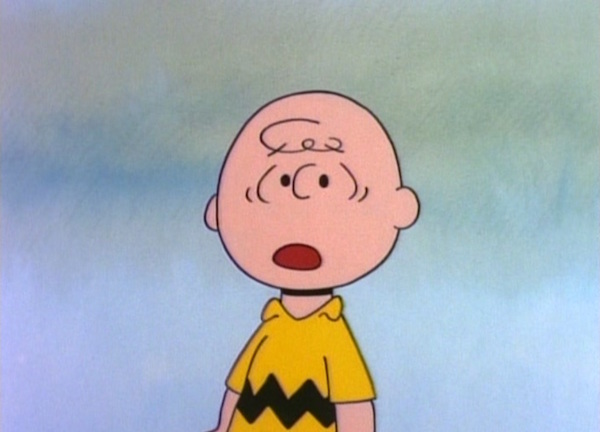
I love Wes Anderson. I don’t care about the fussiness, the repetitive plots, the twee, unrealistic dialogue, I just love him, and I have ever since I saw Rushmore. I believe that Anderson’s whole, multi-film project is to distill the emotion created by a Peanuts special and somehow build a movie around it, and it never fails to work on me. I would argue that it’s the Thanksgiving special above all that inspired him, because, well, look at that color palette.
Those clouds are the exact color of seasonal depression. But now, contrast with these two scenes from the end of the special, when it’s supposed to be about 4:30 in the evening:
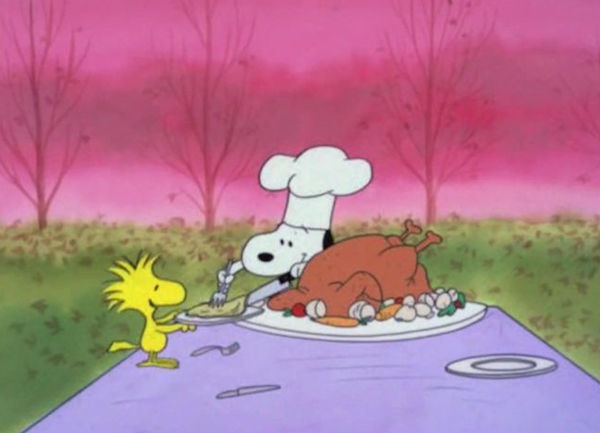
Look at that amazing mauve!
And this orange below, as the last bit of sunlight fades behind Snoopy and Woodstock:
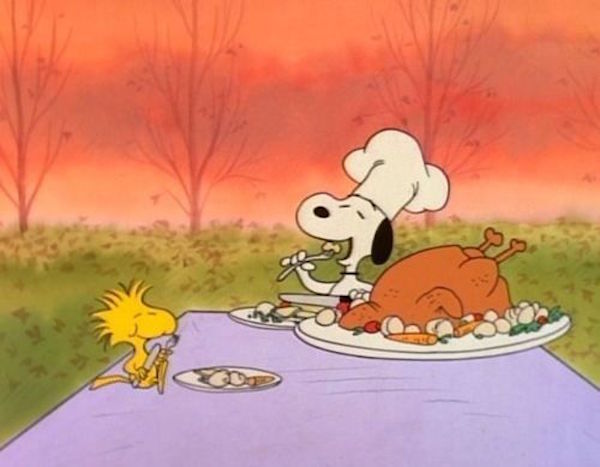
Where the Halloween special gave us vibrant autumn colors, and the Christmas special contrasts Charlie Brown’s sadness with bright lights and starry skies, the Thanksgiving special fully submits to the muted colors and wistfulness of late November. Even though the special never reaches the heights of the Halloween and Christmas outings, the aesthetic here is by far my favorite.
Maybe a little too much Snoopy?
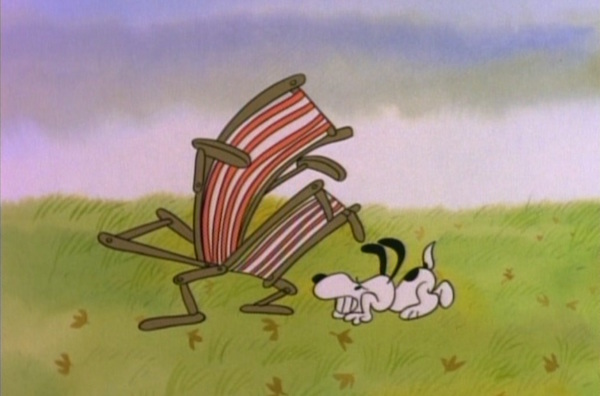
I know, I know, heresy. I thought the Red Baron stuff in It’s the Great Pumpkin, Charlie Brown was odd, but at least it had real personality, and contributed an interesting moodiness to the special. Here, Snoopy gets in a fight with a garage door, then he gets in a fight with a lawn chair. He cooks most of the meal for the kids. He bullies Woodstock into cosplaying as a Pilgrim. Basically, he gets wayyy more setpieces and slapstick than any of the human characters, at the expense of three newer characters, Patty, Marcie, and Franklin, who could have been given more distinctive roles. Having said all of that, even I have to bow before Snoop’s toast-buttering skills:
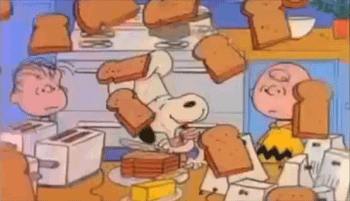
Which leads us to: The Feast!
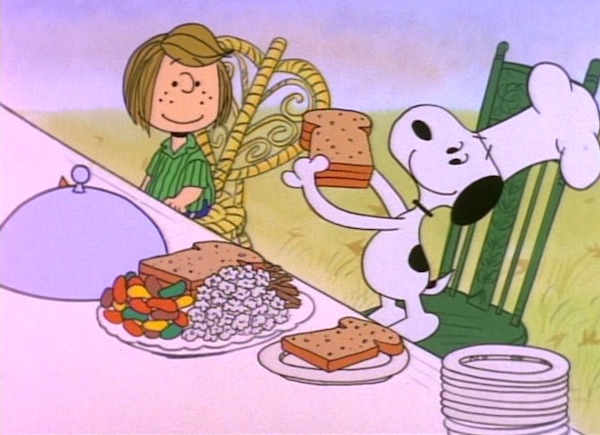
There’s a reason the Peanuts specials have endured while others have fallen by the wayside. Part of that reason is that thanks to their underlying strain of depression, they reward repeat viewing by adults. But the bigger reason is that they capture the loopy, indirect way children think. When Patty invites herself over, Charlie’s first response isn’t “Why aren’t you spending this national holiday with your family?” It’s “I can’t cook a Thanksgiving dinner. All I can make is cold cereal and maybe toast.” And following on that logic, that’s exactly what they make. Toast, popcorn, jellybeans, pretzels, and something that’s either an ice cream sundae or a milkshake. And despite Patty’s disapproval, this is a perfect Thanksgiving feast. Just as the Pilgrims cobbled together whatever food they could, and took handouts of venison from Indigenous people, so the Peanuts Gang forages for a perfect kid-friendly meal, and is reminded that what truly matters is celebrating the holiday together, surviving the harsh New England winter, avoiding smallpox, and not being executed by King James I.
A Surprisingly Woke Charlie Brown Thanksgiving
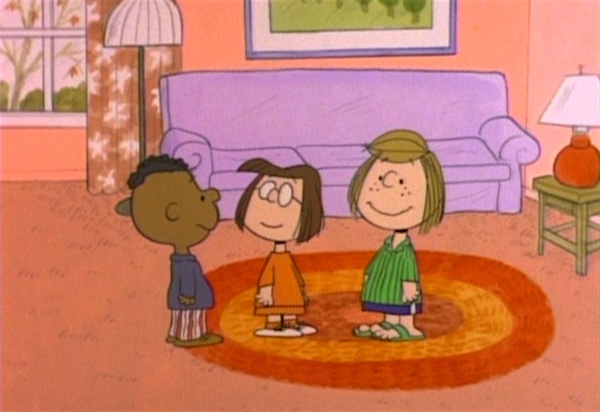
Patricia “Peppermint Patty” Reichardt was Schulz’ conscious response to the feminist movement of the 1960s. When she was introduced in 1966, she was the first female character to wear shorts and a t-shirt instead of a dress, and she defies the dress code (and cold weather) by wearing sandals every day. While a lot of the Peanuts girls play baseball, Patty loves sports, and is both the coach of her baseball team and an avid figure skater. She has a close relationship with her single, widowed father, and she waits up for him to get home from his late shift each night despite the fact that it exhausts her. She does terribly in school, maybe because of this. So right here we have a portrait of a working-class, iconoclastic, proto-feminist girl. And then we can look at her relationship with Marcie and bask in the glory of an aced Bechdel Test. Because while we see Lucy pal around with Frieda and Violet and the other girls, we more often see her acting as antagonist to Linus and Charlie Brown, and Sally is the eternal baby sister, tagging along with the bigger kids. But in Patty and Marcy we get a pair of equal female friends, who may fall into the roles of “brash tomboy” and “quiet nerd” most of the time, but who can also throw those roles out the window to have real conversations with each other.
Marcie, as a straight-up nerd, is also a new female character for the Peanuts world. She does well in school, she’s quiet and thoughtful, and seems to accept people. (Well, most people. She did punch a boy named Thibault in the face once for telling her that girls shouldn’t play baseball, and “should learn their proper place.”) She also takes Linus’ usual place as the moral center of the special. She calls Patty out for being rude, and then agrees to play peacemaker.
I think it’s also worth noting that Woodstock, the loopy bird who is still far more sensible and in touch with reality than his buddy Snoopy, was named for the concert, a nod to the hippies that many men of Schulz’ age would have just feared. Instead, Schulz extended an olive branch.
And finally, Franklin. Franklin was introduced in 1968, about three months after Martin Luther King Jr. was murdered. Schulz was urged to include an African-American character by a teacher named Harriet Glickman, who not only wrote to Schulz the first time, but also followed up with supportive letters from her black friends after Schulz worried that creating a character would be condescending. Once he came around, though, Schulz stuck to his principles; threatening to quit when an editor wanted him to remove the character, and depicting Franklin sitting with Patty and Marcie at school despite angry letters from segregationist Southerners.
Franklin is given very little to do in the Thanksgiving special. He asks if he should wear a tie, and gets a tiny moment of slapstick when Snoopy seats him in the evil lawn chair, but other than that he’s just… quiet. Patty is the real engine of the special, with Linus and Marcie as its moral voice. Franklin and Sally just kind of hang back and watch. Now, in 1973 this was still pretty groundbreaking, but as U.S. society has slowly, through gritted teeth, accepted that maybe sometimes progress happens, people have pointed out that the special may have perpetuated some of the racism it was trying to combat:
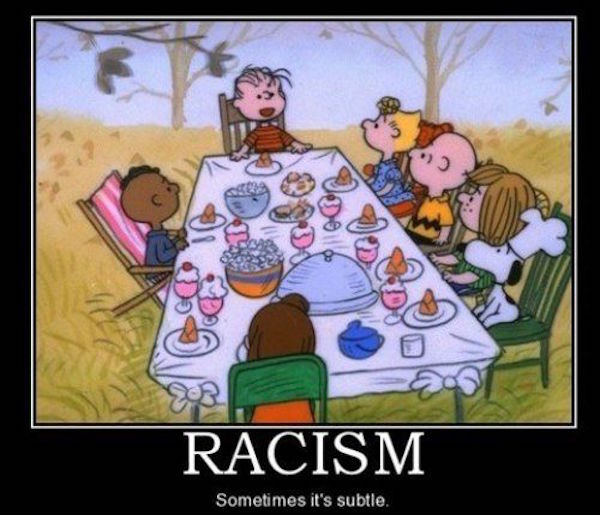
While I doubt this was intentional on the animators’ part, it is an interesting moment. Even as the special tries to embrace diversity, and reflect America as it is, it unintentionally highlighted the loneliness and tokenism of being the one POC at the table. It’s also interesting to note that if you search for A Charlie Brown Thanksgiving, you’ll find images for the Google Play interactive version of the special that change the seating arrangements:
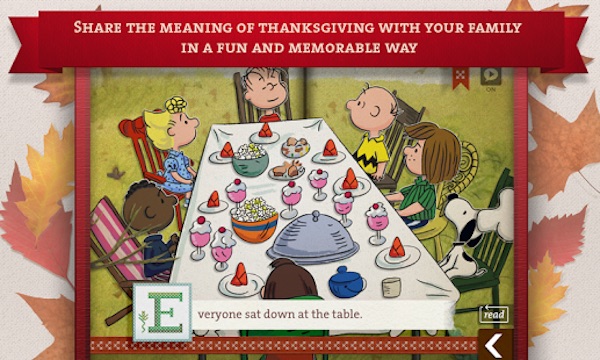
There is one unambiguously cool moment, though, when Charlie Brown and Franklin greet each other with an elaborate handshake.
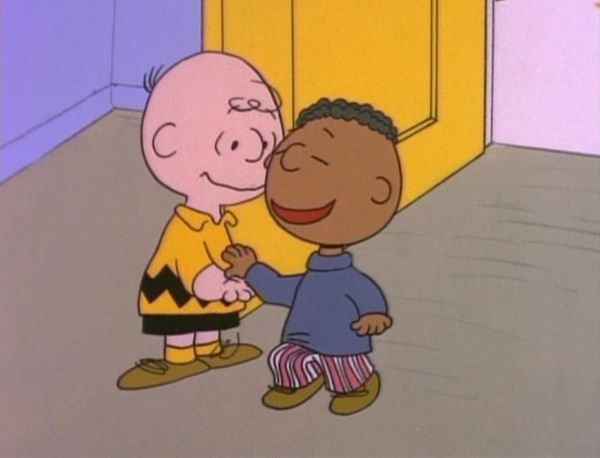
This moment more than any other highlights the fact that Franklin and Charlie do have a real relationship outside of this Very Special Special.
But ultimately, A Charlie Brown Thanksgiving is the perfect expression of this holiday.
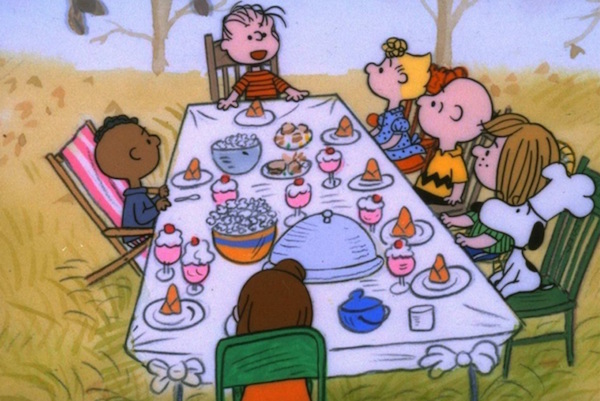
Thanksgiving is always a tense holiday. As Linus tells us, the United States was the first nation to devote a holiday to Thanksgiving, which on its surface is great. But it also means that depending on your religious and ethnic background, you could feel a terrible pressure to conform to an ideal “American” performance of the holiday. This holiday trades on a shallow and stereotypical view of Indigenous people without truly engaging with the history of colonialism. The idea of fighting over politics at the dining table is so ingrained that jokes about inappropriately intoxicated aunts and uncles have been staples of the holiday for decades. And obviously, if you’re a vegetarian, Thanksgiving is a minefield. Upon rewatching the special, I was happy to find that this tension is precisely where A Charlie Brown Thanksgiving shines. The kids gather around the table, reject the “traditional” meal for a far more whimsical one. Charlie Brown overcomes his fear of humiliation to offer his guests hospitality, and Linus and Snoopy come through by helping with the toast and the popcorn. They all gather together regardless of ethnicity, gender, or species. They’re seemingly all pleased with the nondenominational prayer Linus comes up with: “We thank God for our homes and our food and our safety in a new land. We thank God for the opportunity to create a new world for freedom and justice.” When one person (one of the most “progressive” members of the group) gets mad and demands her traditions back, she’s called out by her friend for her rudeness. And this is when the Thanksgiving miracle occurs: Patty realizes she’s been wrong and apologizes to ol’ Chuck. And as a reward for this open-mindedness, everyone is welcomed to the ultimate in tradition, a meal with all the trimmings at Grandma Brown’s. Has there ever been a Charlie Brown special with a happier ending?
Except, hang on, this isn’t the perfect Norman Rockwell painting you were imagining, because GRANDMA BROWN LIVES IN A CONDOMINIUM.
You may deny the future, but you can’t stop it from happening.
Originally published November 2016.










